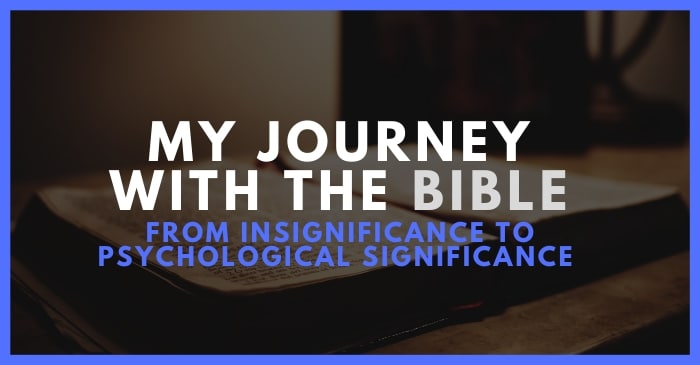I understood the importance and value of messages like “treat others as you wish to be treated,” but I didn’t understand why these teachings were embedded in such strange stories.
The world was created in seven days? How can we know this for sure? The first two humans lived in a walled garden with a talking snake? Is this true?
I thought the Bible to be unbelievable and strange, especially under literal interpretations, and I never found answers to my questions within the Church as sermons ranged from ambiguous and vague to unquestioning faith and belief.
It also didn’t help the light in which I saw Christianity given the actions of its more outspoken representatives (i.e. Westboro Baptist Church) and the lifted veils revealing suppressed wrongdoings (i.e. Catholic priests).
Despite my early skepticism and aversion to the Bible, I’ve recently been reacquainted to this text thanks to the lectures of a man named Jordan Peterson who interprets the Bible not from literal or historical interpretations, but from a universal, secular and psychological perspective.
ENTER DR. JORDAN PETERSON
Dr. Jordan B. Peterson, a clinical psychologist and professor at the University of Toronto, is well-known from his viral YouTube channel and political commentary. Most interesting to me are his lectures on the Bible and mythology. In these lectures, Dr. Peterson analyzes the books of the Bible within the frameworks of psychology, behavioral evolution, neuroscience and comparative mythology, and cites the works of Joseph Campbell, Carl Jung, Freud, Nietzsche, Tolstoy, and other great thinkers as his influences.
Dr. Peterson also lectures on how the Western world, although far from perfect and undoubtedly plagued by corruption, violence, scandal, etc., has discovered something that’s worth defending — when compared to socialist states with extreme collectivist mentalities like Venezuela, the West is a paradise in terms of access to information, free speech, food and water accessibility. For empirical evidence, see how the rise of democracy correlates with reducing poverty, improving basic education and other amazing measures of global development.
Dr. Peterson attributes much of Western success to individualism, a concept foundational to democracy and, as he explains, a key idea rooted within the Bible, stating that one of the Bible’s central messages is “the individual, not the state, is the source of redemption.”
The first listen worth your time is Peterson’s Psychological Significance of the Bible Series and his Maps of Meaning Series (links to the podcast). It’s intriguing to hear his interpretations of ancient texts, specifically his analysis of two well-known stories, the story of Adam and Eve as well as the story of Buddha, because each are stories of humankind’s psychological awakening.
THE FALL, AKA THE AWAKENING

Michelangelo’s painting of the forbidden fruit.
Adam and Eve live in a walled garden but after they eat from the fruit of the tree of knowledge of good and evil they become “self-aware” of their situation, aka “self-conscious”. Now think about the last time you became self-conscious. It’s a vulnerable feeling, right? The concept is well represented by Adam and Eve’s sudden newfound nakedness, but what happens when one feels naked and vulnerable? Their eyes are open and they become awake. Adam and Eve are then “cast out of the garden”, meaning once you become self-conscious and self-aware, there’s no going back; humanity is separated from nature and the outcome is a relationship with culture. Awakened to the unavoidable realities of life, Adam and Eve immediately clothe themselves and prepare for a life of work — most notably of the need to self-sacrifice and the endless suffering that comes along with sacrifice.
Consider how humans are the only animal we know of who can consider the future. This is the greatest discovery of humankind because this knowledge grants us the ability to “sacrifice” our present selves for our future selves, setting us and future generations up for success in the future.
THE LAWS OF NATURE

Buddha encounters old age, sickness and death.
Likewise, the story of the Buddha draws interesting parallels under psychological analysis. As the story goes, an angel told the Buddha’s father he will have a son who will be aesthetic and reject the life of a prince. Horrified by the news, his father constructs the perfect mansion for his newborn son to live in, a place where only young, healthy servants can serve him (walled garden, anyone?). As he grows up, the Buddha becomes curious and ventures out past the walls of his mansion. There, he comes in contact with the truth of life: sickness, old age, and death. This is Buddha’s discovery of the future, of impermanence and suffering.
KNOWLEDGE VS. WISDOM
Exploring the psychological significance of ancient texts have shed new light on old stories and awakened a curiosity within me. I’m not sure how interested I am in Christianity the organized religion, but I’m fascinated by the text which preceded it because I see now how this text can tell us about the mind. And the more I learn about the mind, the less I find it controls me and the greater my psychological health.
The one flaw I see in going down this rabbit hole is that the understanding of a text should not be for philosophical games but instead should be acted out. One should see practical improvements in the life and in the lives of those around you.
This remains one of the many reasons I’m attracted to meditation — meditation is largely unattached to intellectual games since everyone can understand its teachings; all that’s required is one sits and learns from their direct experience, no interpretation or fictionalizing needed.
I was listening to a podcast called The Buddhist Society of Western Australia where a Buddhist teacher named Ajahn Brahm was giving a speech and a student asked him: “All the greatest religions of this world have a text, but what is the Buddhist’s text?” Ajahn Brahm looked at him and smiled. “Meditation,” he said.
Unlike meditation, the Bible is much more complex, but to cast it away completely would be a disservice and likely the downfall of Western society. The Bible is a testament to the fact that people are storied creatures, stories are eternal, and we must put the lessons of the world into a story to remember, to create meaning and to make them eternal.
One does not have to label themselves as Christian to study the bible. Nor must any labels be taken on while reading or becoming interested in any mythology or ancient text. Defining oneself by and adhering to a label, I believe, hinders the growth and complexity of an individual because it pigeonholes them into a certain way of thinking. And what difference is there between fully accepting an ideology and blind faith? While many subscribe to various ideologies (left vs. right, up vs. down), the rest of us understand that choosing sides and plugging into a pre-existing set of beliefs is a lazy, albeit time-saving, way of going about life.
I look forward to where this rabbit hole leads me. I know little of the subject but as you can tell I’m quite intrigued so far and think you will be too. Feel free to dive in with me; I’d love to know your thoughts on the matter.





2 Comments
Leave your reply.